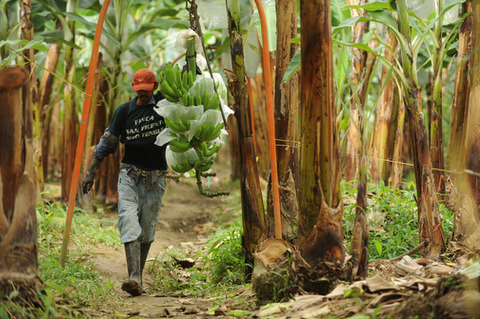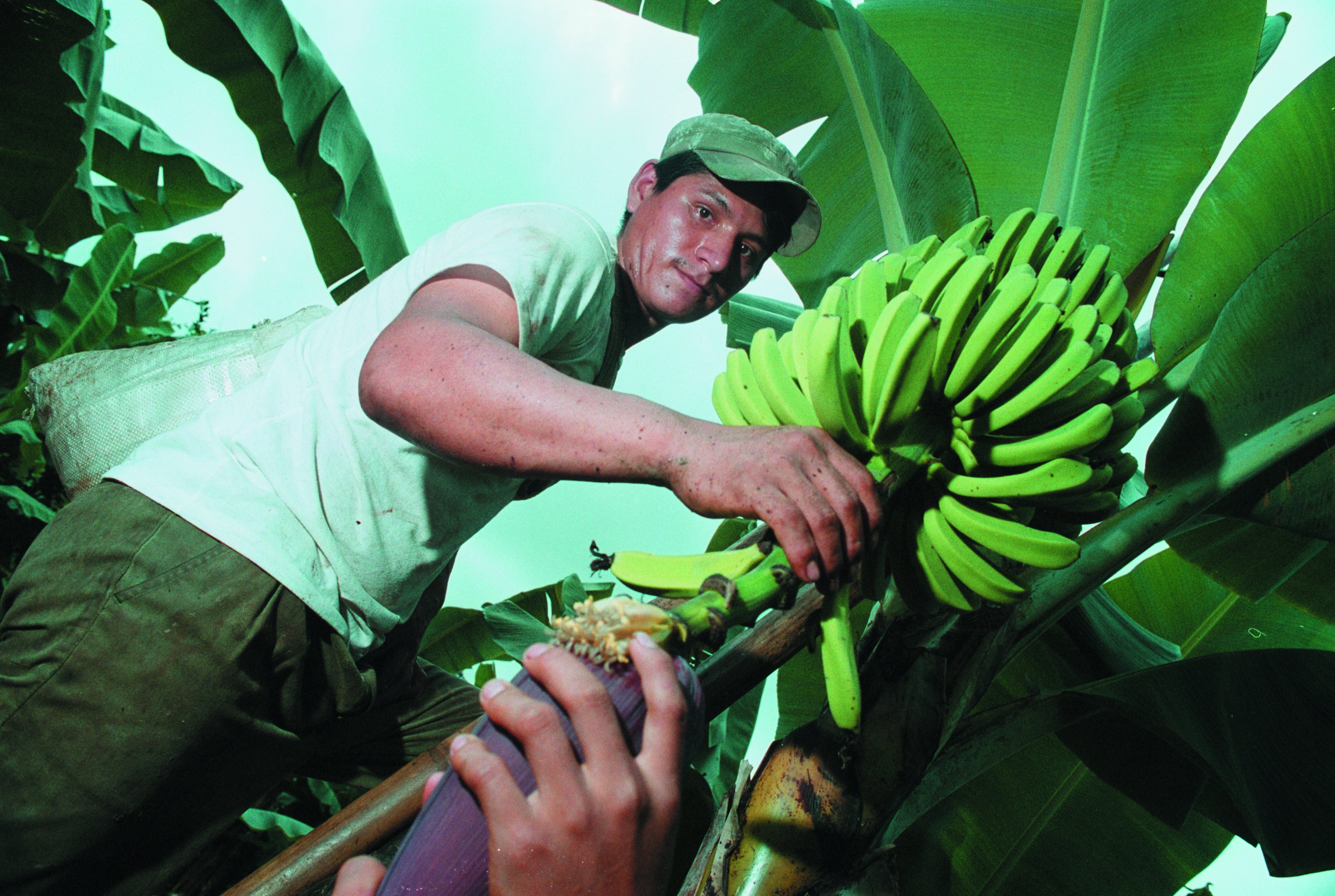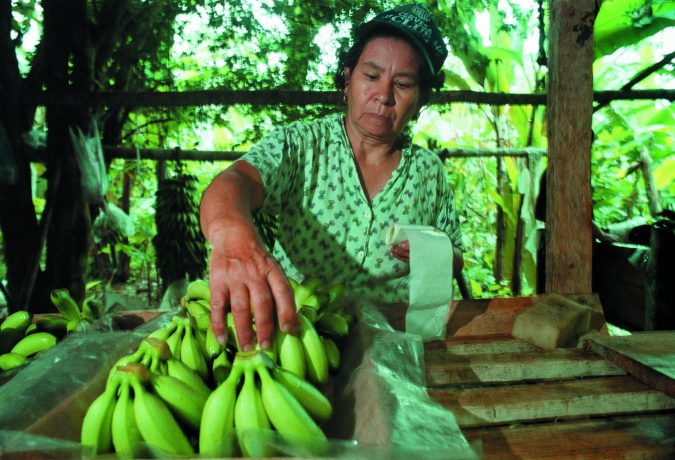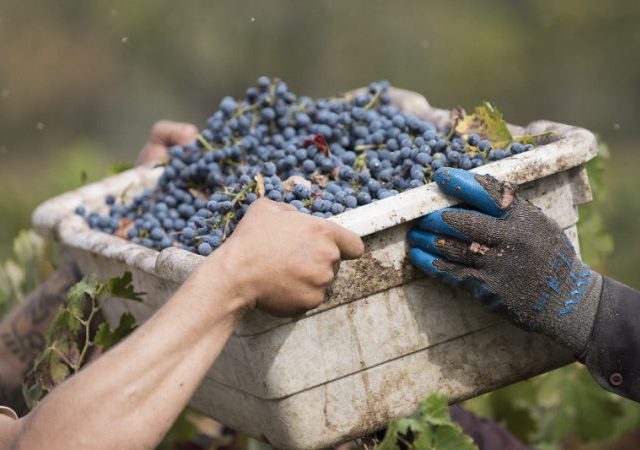Pesticides and bananas? Although bananas are not on the Environmental Working Group’s Dirty Dozen List, they are one of the most chemically intensive crops grown. The list can mislead people into thinking conventional bananas must be ok to consume. However, just because bananas have a peel, many believe that all of the pesticides are on the outside of the fruit. But think again – and choose organic, whenever possible.
4 Things You Should Know About Pesticides and Bananas
1. Non-organic bananas are grown on large plantations, year after year, without crop rotations. This makes them highly susceptible to pests. As a consequence, non-organic bananas are heavily sprayed with synthetic insecticides and herbicides. For example, chlorpyrifos, an organophosphate neurotoxin, which harms farm workers as much as the environment.
2. Non-organic bananas are grown with the intense use of synthetic fertilizers to maximize production. Because the uptake of synthetic materials by the plant is not fully predictable, over-fertilization of bananas is common. This again exposes farm workers to chemicals but also impacts the coastal regions, fish populations, and communities living nearby.

3. Studies have shown that the skin of a fruit is permeable, similar to our own skin and that a certain amount of toxins do end up in the fruit, no matter how protective the skin may be. Safe handling when eating a banana or feeding a baby may reduce your exposure to harmful pesticides. This includes washing the peel of a banana before consumption. However, this will not necessarily protect you from pesticides as some may already be inside the flesh, and therefore cannot be washed off.
4. We compost the peel of a banana, or it goes into the landfill. Either way, the chemicals sticking to the skin of the banana will ultimately leach into our soil and groundwater, wherever we may place the peel. As a result, the chemicals that end up in the groundwater come right back to us via our drinking water, cooking water, or shower water.

Avoid pesticides and ask for organic and fair trade certified bananas. While there are many choices, we stand behind Equal Exchange Bananas.
Originally posted 2017-06-01 10:19:34.








Quick question…I understand that the banana skin may have a permeability to it…that would allow the passage of pesticides and other chemicals…it seems to me that the continual growth of banana w/o crop rotation…and the continual use of synthetic pesticides…would result in a heavy residual in the soil…shouldn’t this also result in the pickup of pesticides and chemicals via the root system and into the developing flesh of the fruit…and continue as old plants are replaced with new…maybe this a little longer than I thought…forgive the pun…but thank you for the food for thought…
Bob
Thank you for your comment and thoughts, Bob! We have not yet seen a scientific study on pesticide residues in conventional banana production operations, or the uptake of pesticide residues in the soil by banana plants via their root system. However, this dynamic has been documented for vegetables and one would assume that most or all plants follow the same ecological principles. Bananas remain as one of the heaviest sprayed fruit, and you are right, because of zero crop rotation, anything applied would bio-accumulate and could eventually be taken up by the banana plants, old or new. The absence of crop rotation or intercropping with, for example, legumes or vetch, which is common on organic vegetable farms, also does not provide the soil any rest or cleaning of chemicals or nourishment back into the soil on conventional banana operations. So, in essence, given these issues, it is important to choose organic bananas when ever possible. Thank you again for your input!
As a horticulturist l have an understanding of what growers are up againest regarding the use of pesticides. It is just to risky not to use them, otherwise whole crops could be lost. But in this modern day and age l believe there is the where with all to eliminate the need for the use of chemical pesticides. My ideas may seem a little naive but with some research and work on them more realistic results could be achieved. A for instance the use of insecticides on banana plantations. Could be replaced by a more cultural method. Insects are attracted by colour and light. If there was a large double sided panel containing the colours and light spectrum that insects are attracted to that could be mobilizer. To run constantly in the avenues between the rows of banana trees the insects would opt for the panels rather than the trees. Such a method would possibly not see to all the insects but would certainly reduce the numbers that would choose the trees as a host. That’s just one idea. Patrick Merrick
The previous comment l added on how to eliminate the need for the use of pesticides on banana plantations may be a bit bazaar. But it is a focal point of alternative methods of controling pests in banana plantations. With out the use of harmful pesticides. An other obvious solution to explore would be the development of non harmful organic pesticides.
From the point of view of cultural control of insects that would be harmful to banana plants. A selective light and vacuum tubing could possibly be developed. Rather than light panels. With a study of the ecosystem of banb
So is it true that organic bananas are not sprayed with pesticides at all? I have read that organic doesn’t always mean pesticide free